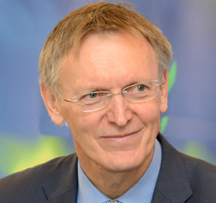Food Systems Podcast 45
In discussion with Janez Potočnik summary
Thursday, Feb 02, 2023
In this episode, we discuss with Janez Potočnik, Co-chair of the United Nations International Resources Panel and Chairman of the Forum for the Future of Agriculture, his assessment of last year’s COP meetings on climate change and biodiversity, the need for demand side solutions and the role he sees the Forum, now 15 years old, playing in 2023.
How do you assess the outcomes of COP 27 in Egypt on climate change and COP 15 in Montreal on biodiversity?
They were both extremely important meetings. COP 27 was the first time high-income countries acknowledged their responsibility. That creates a good base to focus on core issues about warming itself. I see two or three main problems linked to the climate convention. It is a bit too narrowly focused on CO2 emissions and not addressing questions in a sufficiently systemic way.
There is too much focus on the supply side and not enough on demand. Looking at how to clean up the wrong economic system, but not asking how we can improve things that are the consequences of the system and lead to climate change and biodiversity loss.
Montreal was quite successful with some important agreements, especially on finance and targets. Implementation will now be critical. We must address overproduction and overconsumption of natural resources.
Are you optimistic or pessimistic that we can collectively rise to the challenges of climate change, biodiversity loss and creation of a more resilient food and agriculture system?
On a personal level I will always remain an optimist. There are many interesting developments and good intentions, but my fear is that we sometimes use these as an excuse not to deal with the main system challenges. We need to go to the core of the drivers, pressures and market incentives.
The World Economic Forum recently identified ten major risks categorising them in a two or ten-year time span. The latter are all related to the environment, to things we know we must already address now. It is critical that when we solve questions in a short-term perspective, we bear in mind how we simultaneously tackle the longer-term risks.
Do you feel that with Ukraine, Covid and extreme weather, people are more aware today of the fragility of the planet than in the past?
These are exposing some of the immediate questions that need to be addressed. But the effects of the fragility we have been exposed to for many years cannot be handled only by fixing those short-term challenges. Taking painkillers to address some systemic disease never ends well.
What key actions do you think government, business and NGOs should take?
We must correct market signals and bear the cost of environmental depletion in our daily behaviour and consumption. I don’t believe this can be done quickly, but we should focus on tax systems, subsidies, public procurement and tax havens.
We should work on social acceptance of the transition towards sustainability by raising awareness among the public and helping those in need. In short, making our societies more equal as a kind of precondition for the successful environmental related transition.
We could focus on different kinds of business models to satisfy human needs while using fewer natural resources and energy. That is the core of the issue. Pesticide producers could, instead of selling pesticides, offer a service, using their products, expertise and equipment to protect land from pests. This would appeal to small farmers who lack the necessary knowledge and funds to apply high tech solutions and incentivise companies to use fewer pesticides since these would become a cost, not a source of profit.
What role do you expect the Forum for the Future of Agriculture to play this year in stimulating ideas about changing business models and acting in a different way?
There is no time to lose and we must move from words to better implementation in practice. We have a unique structure of partners covering all aspects of governance and, for me, the most important is that they are consistent with our joint understanding of what the forum stands for.
We should push each other, inside and outside the forum, to go further and faster. We must continue focussing on using our convening power to find solutions.
If you have found this short summary interesting, there’s lots more to hear in the full 24-minute conversation. It is available now on iTunes, Podbean or Spotify or on this website.

Janez Potočnik
Dr Janez Potočnik graduated from the Faculty of Economics at the University of Ljubljana, Slovenia. After a successful career...see more
